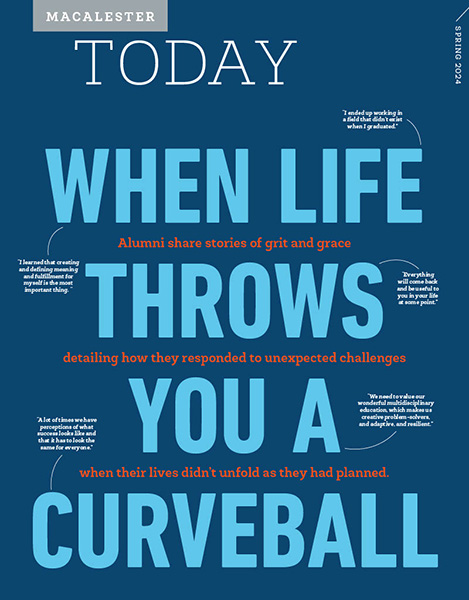
By Julie Hessler ’85 / Photo by Natalie Champa Jennings
One alumnus’s family asked Chaplain Kelly J. Stone to include the music of Metallica as part of the celebration of his life. The heavy-metal notes jangled around the interior of Weyerhaeuser Memorial Chapel’s distinctive glass hexagon.
For Ruth Forbes Turner ’45, who deeply loved the natural world, Stone traveled to Wisconsin to lead the funeral service and read Finally, a poem by Wendell Berry that begins:
Finally will it not be enough,
after much living, after
much love, after much dying
of those you have loved,
to sit on the porch near sundown
with your eyes simply open,
watching the wind shape the clouds
into the shape of clouds?
Another alumnus loved literature. For her memorial service, her family brought a box of her books to the chapel, and guests were invited to take a book to keep in her memory.
Stone estimates that in her ten years at Macalester, she has presided over thirty celebrations of life, memorial services, and funerals for alumni and other members of the Macalester community. Along the way, she’s gained insights into what this place means. “This place has a soul that people take with them and preserve,” she says. “A former colleague of mine, Rabbi Barry Cytron, once said, ‘Some people go through Mac; for others, Mac goes through them.’ For some people, this place lingers as a place of importance, and depth, and meaning in their life.” As our community continues to reflect upon our 150 years, Stone shares what goes into honoring our lives, and what she has learned about us in doing so.
“So many people think of me working with students alone,” says Stone, whose official title is associate dean for Institutional Equity and college chaplain. “I am chaplain to the entirety of the college community in different ways.”
Her alumni-related contacts often start with a phone call: Can we use the chapel for a funeral? Can someone play “Amazing Grace” on the bagpipes at our celebration of life?
If loved ones are looking for help in creating a ceremony, Stone takes time to sit down with them and do some deep listening.
“As much as death is not a season where people think about creativity, for me it’s an opportunity to co-create with people and to create a ritual that has room for tears and laughter, for stories and song, for all the things that humans need to mark, and celebrate, and grieve,” she says. “It feels outside and totally in line with my job at the same time.”
As part of her training to be a chaplain, Stone undertook clinical pastoral education, a summer-long internship in which students practice having what are called pastoral encounters. Stone worked in a hospital and says the experience provided a deep look at herself and how she relates to others, and affirmed her love for stories and for the complexities that make up each life.
As she prepared for Ruth Forbes Turner’s funeral, she learned that Turner, like many other alumni, was a voracious learner. “Macalester was part of their unceasing desire to learn and be truly a citizen of this world, and digest what the world has to offer them,” she says. “That’s come up again and again, especially for some of our oldest alums in their funeral moments, that they continued to devour poetry, and literature, and newspapers until their final days.”
Honoring the lives of beloved staff and faculty provides another dimension. Their influence is often part of just how Mac lingers in our lives. Thad Wilderson, who worked at Macalester from 1969 to 2000, was a counselor, associate dean, coordinator of community relations, and “a steadfast presence for students that were part of the EEO program,” Stone says. She describes his 2022 homegoing celebration in the chapel as also a homecoming for many in the audience.
One of the things Stone likes best about Macalester is that, as she puts it, “none of your life needs to be hidden.” The warm and welcoming words she uses to open an end-of-life ceremony can be adapted for various faith traditions, as well as for those who don’t believe at all. “We honor a lot of intersectionality,” she says. “There is also this trust and confidence that this place can handle the complexity of identities that people hold.”
Recently, Stone spoke with a student who was struggling with the meaning of the college’s Presbyterian roots. “The reality is that Macalester was founded to educate and broaden people’s worlds,” she says, “not to narrow and define people’s worlds.” She describes the college’s original seal which depicts two women, one holding open a book with sacred text, and the other with a telescope, gazing towards the heavens.
“There was already, at the very core of this place, the truth that both could exist together,” she says. “And that is very in line with the Presbyterian values, that those things never had to be at odds with each other. That this progressive revelation of the world and our understanding of it was always part of the fabric of Macalester.”
In conducting ceremonies for yesterday’s students, she sees today’s. “Our Macalester students have always been up to good trouble, decade after decade after decade,” she says. “I think that’s beautiful, and that’s something they share across generations.”
Julie Hessler is the managing editor of Macalester Today.
May 17 2024
Back to top





